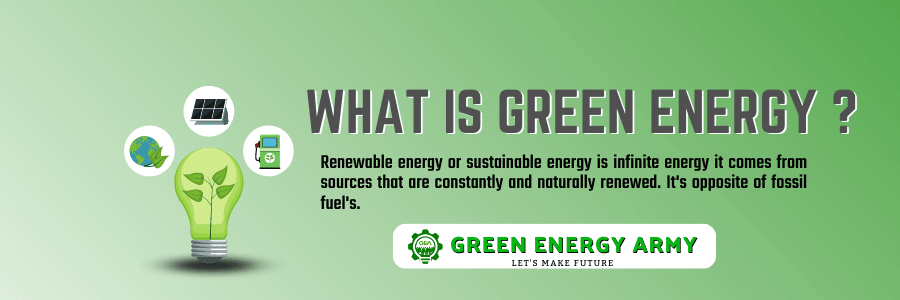What is Green Energy:
Green energy, also known as renewable energy, is becoming increasingly important as the world faces the challenges of climate change and dwindling fossil fuel resources. The use of green energy sources, such as solar and wind power, not only helps to reduce carbon emissions and slow the rate of climate change, but it also promotes energy independence and can stimulate economic growth.
Advantages of Green Energy:
One of the main advantages of green energy is that it is renewable and sustainable. Unlike fossil fuels, which are finite resources that will eventually run out, green energy sources can be replenished and are available in unlimited quantities. For example, the sun and wind will always be available, making solar and wind power a reliable source of energy.
Another important benefit of renewable Energy is that it is much cleaner and more environmentally friendly than fossil fuels. Burning fossil fuels releases carbon dioxide and other pollutants into the atmosphere, contributing to climate change and air pollution. Green energy sources, on the other hand, produce little to no emissions and do not pollute the air or water.
In addition to being environmentally friendly, renewable energy can also promote energy independence and stimulate economic growth. As more and more countries invest in green energy, they will become less dependent on fossil fuels imported from other countries. This can lead to a reduction in trade deficits and an increase in domestic jobs. Furthermore, the growing demand for green energy technologies and the development of new renewable energy projects can create new business opportunities and jobs in the energy sector.
Feature of Green Energy:
The use of green energy can also have a positive impact on public health. The burning of fossil fuels releases harmful pollutants into the air, which can cause respiratory problems and other health issues. Green energy sources, on the other hand, do not produce harmful emissions, reducing the risk of respiratory problems and other health concerns.
One of the most significant benefits of renewable energy is that it can help slow the rate of climate change. The burning of fossil fuels is the primary source of carbon dioxide emissions, which is one of the main drivers of climate change. By reducing carbon emissions and increasing the use of green energy, we can slow the rate of climate change and protect the planet for future generations.
In conclusion, renewable Energy is important for the future because it is renewable, sustainable, environmentally friendly, promotes energy independence, stimulates economic growth, and can have a positive impact on public health and the environment. As the world faces the challenges of climate change and dwindling fossil fuel resources, it is essential that we invest in renewable energy and transition to a more sustainable energy system.
Solar Energy :
Solar energy is a clean, renewable, and abundant source of power that has the potential to revolutionize the way we generate and consume electricity. As the world faces the challenges of climate change and dwindling fossil fuel resources, the use of solar energy is becoming increasingly important. In this blog post, we will explore the advantages of solar energy and the future of solar energy.
Advantages of Solar Energy :
One of the main advantages of solar (Sun) energy is that it is a clean and renewable source of power. Unlike fossil fuels, which release pollutants and greenhouse gases into the atmosphere, solar energy does not produce any emissions or pollution. This makes it an environmentally friendly option for generating electricity.
Another advantage of sun energy is that it is abundant and widely available. The sun is a powerful source of energy that can be harnessed to produce electricity, and it is available in most parts of the world. This means that solar energy can be used to power homes and businesses in even the most remote areas.
Solar energy is also cost-effective. The cost of solar panels and other solar technology has decreased dramatically in recent years, making it an affordable option for generating electricity. In addition, once a solar panel system is installed, the cost of generating electricity is close to zero, as the only cost is maintenance.
The future of sun energy is bright. As technology continues to advance, the efficiency of solar panels and the cost of solar energy will continue to decrease. This will make it even more accessible and cost-effective for individuals and businesses to install solar panels and generate their own electricity.
Future of Solar Energy :
In addition, the growth of the solar industry is creating jobs and boosting economic growth. As more and more people invest in solar technology and install solar panels, the demand for solar panel installation, maintenance, and other related services is increasing. This is creating new jobs and business opportunities in the solar industry.
Governments around the world are also recognizing the importance of solar energy and are implementing policies to support the growth of the solar industry. This includes financial incentives for individuals and businesses to install solar panels, as well as research and development funding for the development of new solar technology.
In conclusion, solar energy is a clean, renewable, and abundant source of power that has the potential to revolutionize the way we generate and consume electricity. The future of this energy is bright, with continued advancements in technology and increased support from governments and the private sector. Investing in solar energy is not only good for the environment, but it also makes economic sense and creates jobs.

